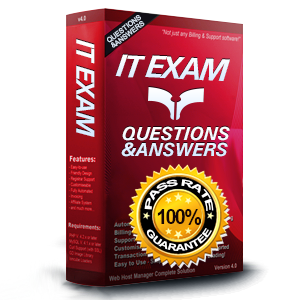
31860X Exam Questions & Answers
Exam Code: 31860X
Exam Name: Avaya IX Calling Design
Updated:
Q&As: 60
At Passcerty.com, we pride ourselves on the comprehensive nature of our 31860X exam dumps, designed meticulously to encompass all key topics and nuances you might encounter during the real examination. Regular updates are a cornerstone of our service, ensuring that our dedicated users always have their hands on the most recent and relevant Q&A dumps. Behind every meticulously curated question and answer lies the hard work of our seasoned team of experts, who bring years of experience and knowledge into crafting these premium materials. And while we are invested in offering top-notch content, we also believe in empowering our community. As a token of our commitment to your success, we're delighted to offer a substantial portion of our resources for free practice. We invite you to make the most of the following content, and wish you every success in your endeavors.

Download Free Avaya 31860X Demo
Experience Passcerty.com exam material in PDF version.
Simply submit your e-mail address below to get started with our PDF real exam demo of your Avaya 31860X exam.
![]() Instant download
Instant download
![]() Latest update demo according to real exam
Latest update demo according to real exam
* Our demo shows only a few questions from your selected exam for evaluating purposes
Free Avaya 31860X Dumps
Practice These Free Questions and Answers to Pass the ACDS–3186 Exam
You are trying to determine how many Basic and Mainstream licenses are needed to support a proposal for Avaya IX Messaging.
Which feature requires a Mainstream license?
A. Multiple greetings
B. Full synchronization with 0365 email applications
C. Distribution lists
D. Multiple Telephone User Interfaces (TUIs)
A customer wants to upgrade their current S8720 Communication Manager 4 (CM) system. They have 2200 users, and a mixture of analog, DCP and IP telephones at their main location. They have six branches with 200-300 stations each served with G700 gateways, each containing an LSP. They want to gain the cost benefits of SIP trunking, and are reluctant to change out the user endpoints, but they want to experiment with a few SIP telephones for some of their remote agents. Survivability and resiliency are essential requirements.
Which elements are required for the solution?
A. Survivable Remote, CM Duplex Core, and Session Border Controller for Enterprise (SBCE)
B. Session Manager (SM), System Manager (SMGR), CM Duplex Core, Survivable Remote with Branch Session Manager, and Session Border Controller for Enterprise (SBCE)
C. Session Manager (SM), System Manager (SMGR), Survivable Remote with Branch Session Manager, and CM Duplex Core
D. Survivable Remote with Branch Session Manager, CM Duplex Core, and Session Border Controller for Enterprise (SBCE)
In a discussion with your customer you are explaining local survivability and the SIP Trunkingfunctionality provided by a Branch Session Manager.
Which two statements would be a part of your discussion? (Choose two.)
A. The Local Survivable Processor (LSP) connects directly to the SIP Service Provider.
B. The control of the branch SIP telephones transfers from the core network Session Manager to the Branch Session Manager.
C. Outgoing calls from the branch are routed through the LSP and branch gateway before going to the SIP Service Provider.
D. The branch gateways connect with the Local Survivable Processor (LSP), which serves as the controller.
A customer with an existing Communication Manager 6 (CM) duplex solution with g4bos and isdn trunks at their main location, is adding some remote sites with G430 gateways and local ISDN trunks for survivability and local calling. They will be inter-connecting them with an MPLS network with limited bandwidth to these remote sites. They want a network design that will restrict voice traffic to a defined level with the ability to overflow to the PSTN.
What would be the minimum network region design look like?
A. One IP network region per remote location, one intervening network region, G.729 inter- region codec, implement Call Admission Control (CAC) with Inter-gateway Alternate Routing (IGAR)
B. Two IP network regions per remote location, (one for the gateway, and one for the telephones), one intervening network region, G.729 inter-region codec,implement Call Admission Control (CAC) with Inter-gateway Alternate Routing (IGAR)
C. One IP network region per remote location, connect each remote network region directly to the main site's network region, G.729 inter-region codec, implement Call Admission Control (CAC) with Inter-gateway Alternate Routing (IGAR)
D. One IP network region per remote location, two Intervening network regions, G.729 inter-region codec, implement Call Admission Control (CAC)
In an Avaya Aura 8.1 deployment, where do Remote SIP Workers ultimately register?
A. Session Manager
B. Communication Manager
C. Avaya Device Adapter
D. System Manager
Viewing Page 2 of 3 pages. Download PDF or Software version with 60 questions

